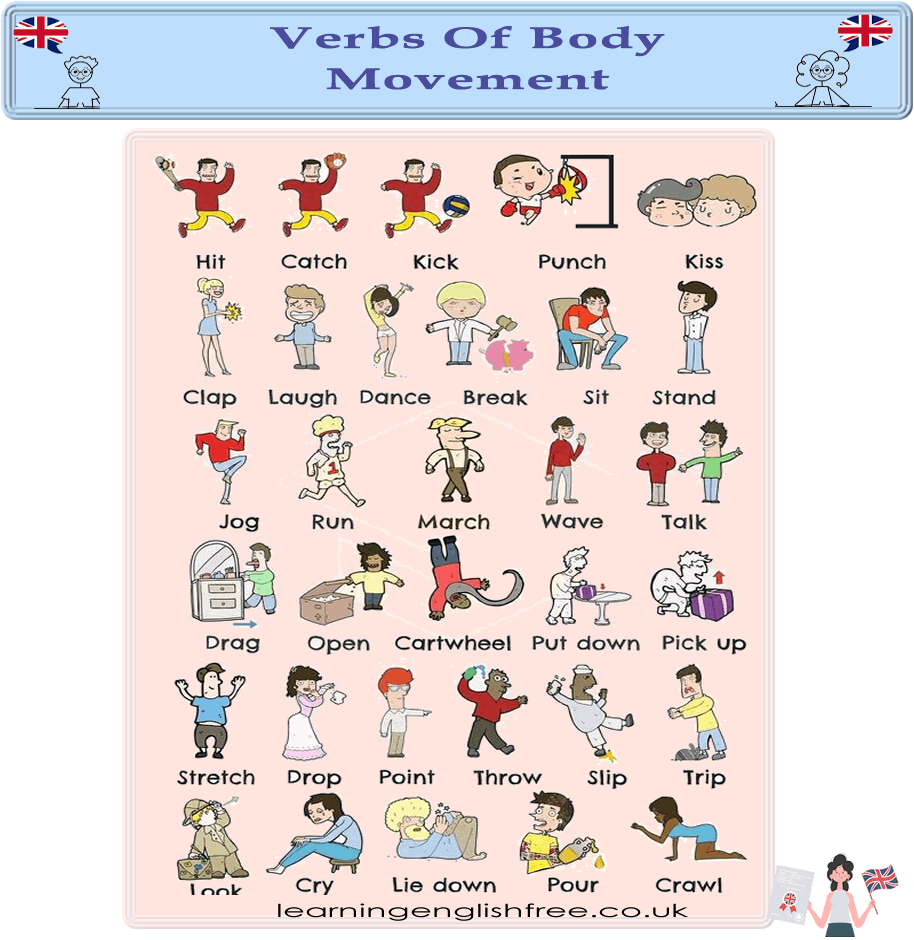
Introduction to English in Motion: Mastering Verbs of Body Movement
Welcome to our lesson on the Verbs of Body Movement. This session is designed to expand your vocabulary with essential English verbs that describe various physical actions. From basic movements like sitting and standing to more complex ones like cartwheeling and jogging, mastering these verbs will enhance your English skills and improve your ability to describe actions in daily conversations.
Learning Objectives
- Identify and understand 32 essential verbs of body movement.
- Apply these verbs in sentences to describe actions accurately.
- Enhance conversational skills by incorporating movement verbs into daily use.
Useful Vocabulary for Verbs of Body Movement
- Hit - To bring your hand or another object forcefully into contact with something.
- The boy hit the ball with his bat.
- Catch - To grasp or seize something in motion.
- She managed to catch the frisbee.
- Kick - To strike or hit something with your foot.
- He kicked the football into the goal.
- Punch - To strike with a closed fist.
- The boxer punched the bag hard during training.
- Kiss - To touch or press one's lips against someone or something as a sign of affection.
- The mother kissed her child goodnight.
- Clap - To strike the palms of your hands together repeatedly to show appreciation or joy.
- Everyone clapped after the performance.
- Laugh - To make spontaneous sounds and movements of the face and body that are the instinctive expressions of lively amusement.
- The joke made us all laugh.
- Dance - To move rhythmically to music, typically following a set sequence of steps.
- They dance together at the party.
- Break - To separate into pieces as a result of a blow, shock, or strain.
- The vase fell and broke into pieces.
- Sit - To adopt a seated position from standing.
- Please sit down on the chair.
- Stand - To be in an upright position on one's feet.
- She asked me to stand up.
- Jog - To run at a steady gentle pace.
- I jog every morning for exercise.
- Run - To move at a speed faster than a walk.
- He runs fast to catch the bus.
- March - To walk in a military manner with a regular measured tread.
- The soldiers march during the parade.
- Wave - To move one's hand to and fro in greeting or as a signal.
- She waved goodbye as the train departed.
- Talk - To speak in order to give information or express ideas or feelings.
- We talk about our plans for the weekend.
- Drag - To pull (someone or something) along forcefully, roughly, or with difficulty.
- He had to drag the heavy box into the room.
- Open - To move or adjust a door, window, or lid so that it is no longer closed.
- Could you open the window, please?
- Cartwheel - To perform a gymnastic movement involving a revolution of the body.
- The gymnast did a cartwheel across the floor.
- Put down - To place something on a surface.
- She put down her book on the table.
- Pick up - To lift something from a surface.
- He picked up the keys from the floor.
- Stretch - To extend one's limbs or body to its full length.
- It's good to stretch before exercising.
- Drop - To let something fall unintentionally.
- He accidentally dropped his glasses.
- Point - To direct someone's attention towards something by extending one's finger.
- Can you point to the map where we are?
- Throw - To propel something with force through the air by a movement of the arm and hand.
- She threw the ball to the dog.
- Slip - To slide accidentally.
- He slipped on the wet floor.
- Trip - To stumble or fall because of catching one's foot on something.
- She tripped over the rug.
- Look - To direct one's gaze towards something.
- Look at the beautiful sunset.
- Cry - To shed tears as an expression of emotion.
- The baby started to cry.
- Lie down - To place oneself in a resting position on a surface.
- I'm going to lie down for a bit.
- Pour - To flow or cause to flow in a steady stream.
- She poured water into the glass.
- Crawl - To move on one's hands and knees.
- The baby can crawl very fast.
Conclusion / Summary and Takeaways
In our journey through English in Motion: Mastering Verbs of Body Movement, we've explored a variety of verbs that describe physical actions. These verbs are not just words but the essence of our daily movements and interactions. By integrating these verbs into your vocabulary, you're not just learning English; you're learning to express the human experience.
Remember, practice makes perfect. Try incorporating these verbs into your daily conversations, or perhaps write sentences or short stories using them. Visual aids, such as flashcards, drawings, or even acting out verbs, can also help reinforce your memory and understanding.
Sharing your learning experiences and challenges with others can provide additional insights and encouragement. Don't hesitate to use these verbs in social media interactions, emails, or letters to friends.
We hope this lesson has expanded your vocabulary and inspired you to move, act, and express yourself confidently in English. Keep practising, stay curious, and always look for new ways to bring your language learning to life.
For more lessons and resources, be sure to share our platform and visit our Facebook page at www.facebook.com/learningenglishfree.co.uk. Your journey to mastering English continues with us, one verb at a time.
